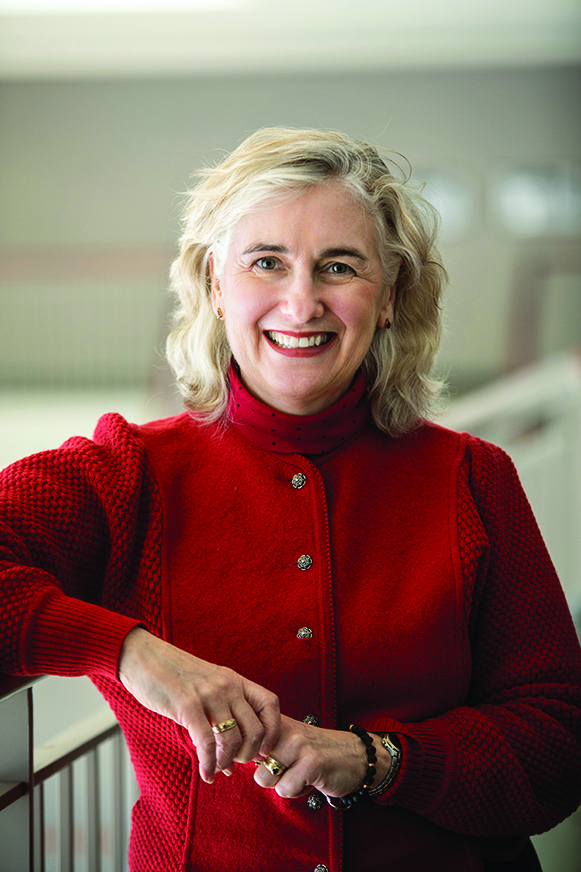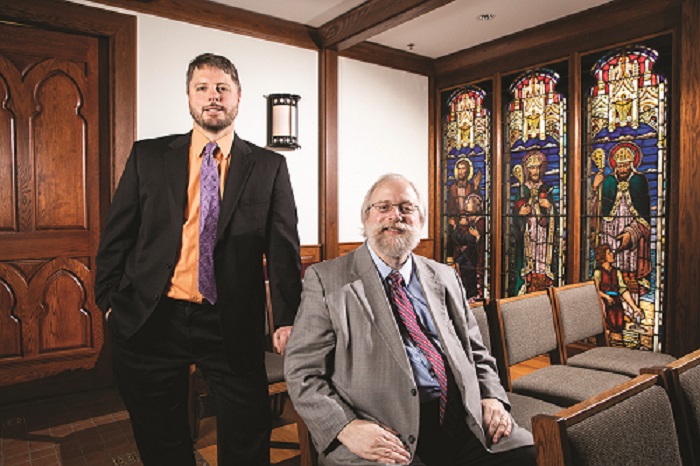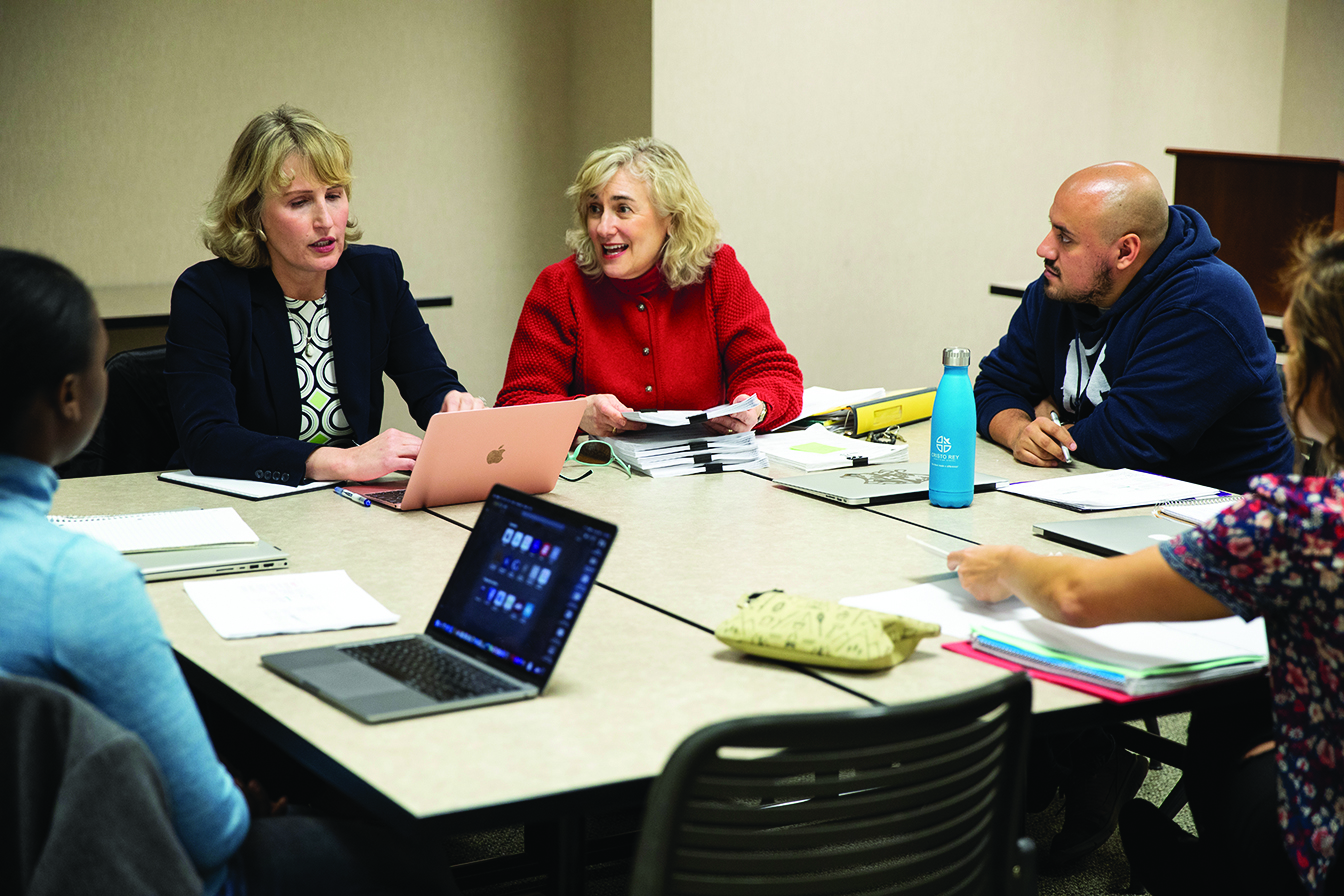Since its inception in 2004, the Terrence J. Murphy Institute for Catholic Thought, Law and Public Policy has served as a space for rigorous, diverse discussions that bring historical and contemporary Catholic perspectives to bear on debates about law and public policy. The institute’s role in today’s polarized society will continue even as Herrick Professor of Law Lisa Schiltz ’10 CSMA steps away from her Murphy Institute co-director role to focus on her School of Law courses, including one on disability law that will be used to launch a disability legal clinic.

Herrick Professor of Law Lisa Schiltz '10 CSMA
Professor Gregory Sisk, Laghi Distinguished Chair in Law, and David P. Deavel, editor of LOGOS Journal and visiting assistant professor of Catholic studies, are taking over as co-directors.
Schiltz, who started as Murphy Institute co-director in 2009, recalled several noteworthy highlights of her tenure.
There was the 2017 Christianity and politics talk featuring Ross Douthat and Dr. Cornel West on the St. Paul campus, which drew more than 1,000 attendees.
“That conversation represented some of the best of what the Murphy Institute aspires to offer … committed conversations between people of faith who hold different views.”
Another high point for Schiltz was a series of events focused on faith and intellectual property law organized by former Murphy Institute Co-director Thomas Berg, James L. Oberstar Professor of Law and Public Policy.
The events started with a private conversation for scholars only, which was followed by a public Murphy Institute conference at St. Thomas, and then a 2015 international conference co-hosted with the
Von Hügel Institute for Critical Catholic Inquiry at the University of Cambridge.
“Those were conversations about things that are of immense importance in the world – public policy issues – informed by people across disciplines (lawyers, theologians, philosophers) talking across religious traditions as well in an eye-opening conversation,” said Schiltz.
The conversations from the international conference led to a collection of essays recently published by Cambridge University Press, Patents on Life: Religious, Moral, and Social Justice Aspects of Biotechnology and Intellectual Property.
High marks for Murphy Institute and Schiltz
Department of Catholic Studies Professor Robert G. Kennedy, PhD, who co-founded the Murphy Institute with Berg, admires Schiltz’s accomplishments. “She has been the principal force behind raising the number and quality of the institute’s activities dramatically over that time,” Kennedy said. “Her vibrant faith, her intelligence and eloquence, and her ability to be a bridge between law and Catholic studies have been indispensable factors in what the institute has accomplished during her long tenure.”

Catholic Studies Professor Dr. David Deavel, left, and School of Law Professor Gregory Sisk.
Deavel and Sisk recognize the contribution of the Murphy Institute to public discourse and are looking forward to becoming co-directors.
“We have big, big shoes to fill, given the tremendous contributions made by Lisa, Bob and other co-directors over the years. If we succeed as successor co-directors, it will be because we built on the firm foundation our predecessors have laid,” said Sisk. “While I am sure that David and I will make our own mark in the years to come, I am excited at the outset to carry through on various initiatives already underway, including a new and strong vision for the student Murphy Scholars program and by continuing the ‘Hot Topics: Cool Talk’ events that have filled such a need for positive and collaborative discussion in our society today.”
Deavel wants to continue the institute’s tradition of scholarship and engagement, connecting Catholic and non-Catholic thinkers and policymakers while continuing to serve students.
“The Murphy Institute has been an important source of both scholarship and scholarly discussion of how Catholic doctrine and Catholic thought affects public policy discussions. People from the worlds of law, politics and policy, philosophy, theology, bioethics, and other scholarly fields have been able to come together in many events and publications to map out ideas for how to put their faith and their expertise together,” Deavel said. “Through the Murphy Institute’s public events, Murphy has been able to put some of that thought out there for lawyers, doctors, politicians, and informed citizens of all kinds to use in their own particular situations. I’m proud to be a part of an institute with such a record of engagement with the scholarly world, the community, and Catholic scholars all to the benefit of the Church and the common good of our community, nation, and world.”
A focus on disability rights issues
Schiltz’s Catholic studies master’s essay topic was a theological reflection on disabilities. The
topic is close to her heart, as both Schiltz’s son and older brother have developmental disabilities. Over the years, she had numerous scholarly articles on disability law published, wrote several pieces for media outlets and gave talks on the topic. Schiltz’s disability law involvement continued its shift from theoretical to practical when she was asked by U.S. District Court Judge Donovan Frank in 2013 to help with a project involving the establishment of a Disability Justice Resource Center website for lawyers and law students working on disability rights issues.
While disability rights have improved in the time since Schiltz’s older brother was a child, she still sees many issues of inequity. For instance, Schiltz said that integrating people with cognitive disabilities into the workplace isn’t moving as fast as it could.
She shared a recent example from the School of Law of how attitudes are getting better, though. Students saw some of their classmates struggling with doors that didn’t have push-button systems, which isn’t required by the Americans with Disabilities Act. They initiated a grassroots movement that resulted in more handicap-accessible classroom doors.
Schiltz’s legal clinic, which will open next spring, will focus on guiding parents through the development of individualized education plans (IEPs), which are plans for students with special needs created in collaboration with school administration, the child’s teachers, psychologists and the parents or caregivers. The IEP creation process typically involves seven to nine professionals and the parents negotiating in a meeting.
“It’s a small service that we will be able to provide to our community … being a place where a certain group of parents will get guidance through the IEP process who might not otherwise have the time, luxury or resources to hire lawyers to work them through it.”
Schiltz said that, while this type of legal work is in demand, she plans on keeping the clinic a modest size in order to most effectively serve parents while providing law students excellent training.
If Schiltz’s track record with the Murphy Institute is an indication, her new clinic will make a significant impact. Regarding the new co-directors of the Murphy Institute, Schiltz said that Sisk and Deavel will be great. “It’s going to be such a thrill to watch.”


